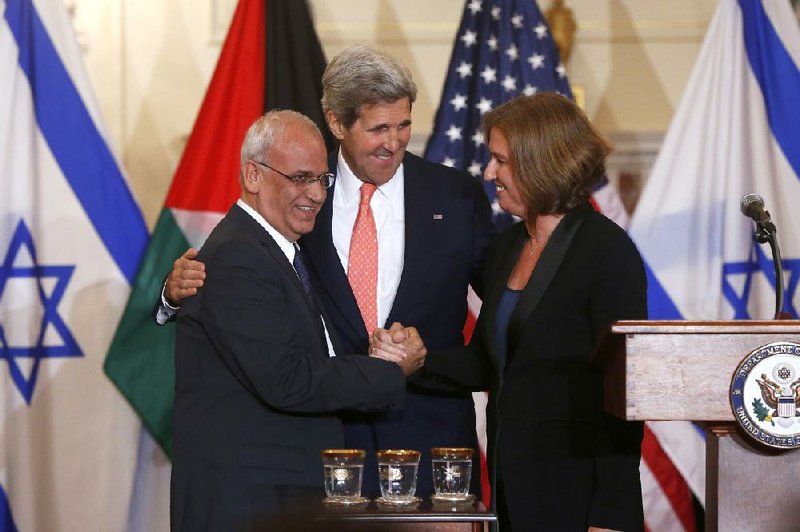WASHINGTON - Israeli and Palestinian negotiators agreed Tuesday to meet again within two weeks to start substantive talks in hopes of reaching a long-elusive peace settlement within nine months.
Speaking after the two sides wrapped up an initial two days of talks at the State Department and visited President Barack Obama at the White House, Secretary of State John Kerry said Israel and the Palestinians are committed to sustained and serious negotiations on the “core issues” that divide them.
Talks will go ahead at the negotiator level for now, with an eventual goal of direct talks between Israeli Prime Minister Benjamin Netanyahu and Palestinian Authority President Mahmoud Abbas. Most meetings will be in the Middle East, with Kerry an occasional visitor, he said.
Kerry is aware of the doubts about the new peace effort, and he acknowledged that the road will be difficult. “While I understand the skepticism,” he said, “I don’t share it. And I don’t think we have time for it.”
All issues, including disputes over the status of the territories and Jerusalem, are “on the table for negotiation, and they are on the table with one simple goal: a view to ending the conflict,” Kerry said.
The United States is expected to step in when bargaining gets particularly difficult or should one side threaten to walk out.
The U.S. had already said the negotiations would continue for at least nine months - roughly until the end of April 2014 - but that had not been set as a time frame for reaching a deal. Kerry and both sides agreed that neither would walk away from the talks or take actions that could disrupt them for that period, two senior U.S. officials said.
The officials also said, however, they expect that the Israelis, over U.S. objections, will continue to build housing for Jewish settlers on land the Palestinians claim, an indication the Palestinians are serious about dropping their long-standing demand for a settlement freeze before returning to talks.
The U.S. believes that the Palestinians will not try to win further international recognition as a state until a peace deal is completed, an effort that one official likened to a potential “train wreck.”
Kerry said Israel, which agreed Sunday to release more than 100 Palestinian prisoners as a good-will gesture, will also take unspecified steps in the coming days to ease harsh living conditions in the West Bank and Gaza. The two senior officials said those measures complement a $4 billion, private-sector economic program that Kerry is trying put in place to assist the Palestinians.
“I firmly believe the leaders, the negotiators and citizens invested in this effort can make peace for one simple reason: because they must,” Kerry said after the conclusion of Tuesday’s preliminary talks. “A viable two-state solution is the only way this conflict can end. And there is not much time to achieve it.”
Kerry’s frequent warning that time is running out for a peace deal is mostly a reference to the challenge posed by the growth of Jewish settlements in the West Bank. In the past five years, the population of settlers in the West Bank has grown by about 20 percent, and pro-settler politicians have become major players in Israel’s government.
Israel has observed an unofficial moratorium on most new housing announcements while Kerry worked to restart talks, but building has continued on previously announced projects.
The negotiations, to be mediated on a day-to-day basis by new Mideast peace envoy, Martin Indyk, will be cloaked in secrecy, Kerry said, and the parties had agreed that Indyk will be the only person to comment on them. He quickly added that he would not comment on them now, leaving unclear the framework for the talks that he struggled for six months to put back on track.
Despite the secrecy, the broad outlines of an agreement are well known: The Palestinians want a state based on the borders, with agreed land swaps, that existed before the 1967 war in which Israel seized east Jerusalem and occupied the West Bank and Gaza. Israel wants security assurances and a recognition that it is and will remain a Jewish state.
The main issues on the table for negotiation include security, borders, the status of Jerusalem, the fate of Palestinian refugees and water, all of which have been responsible for ending multiple U.S.-brokered peace efforts over the past two decades.
The Quartet of Mideast mediators - the United Nations, United States, European Union and Russia - said Tuesday that it welcomed the “courageous decision” of the Israeli and Palestinian leaders to begin the final status negotiations.
The Quartet pledged in a statement to support the efforts, and it called on the Israelis and Palestinians “to take every possible step to promote conditions conducive to the success of the negotiating process, and to refrain from actions that undermine trust.”
Earlier Tuesday, Obama and Vice President Joe Biden met with the lead negotiators - Israeli Justice Minister Tzipi Livni and senior Palestinian official Saeb Erekat - for about 30 minutes. Obama called the meeting to “directly express his personal support for final status negotiations,” White House spokesman JayCarney said. Obama pledged full U.S. support to the process, Carney said.
Livni was accompanied by Yitzhak Molcho, a close adviser and attorney to Netanyahu whom the Jerusalem Post described as her “minder.” Erekat went with Mohammad Shtayyeh, a member of the Fatah Central Committee.
In addition to Biden, Obama was joined by Kerry, Indyk, National Security Adviser Susan Rice and White House Coordinator for the Middle East Phillip Gordon.
At the State Department ceremony later, Kerry was flanked by Livni and Erekat - who each spoke briefly about the need to resolve the longstanding conflict.
“It’s time for the Palestinian people to have an independent sovereign state of their own,” Erekat said. “It’s time for the Palestinians to live in peace, freedom and dignity within their own independent, sovereign state.”
Erekat thanked Kerry for his efforts and said he is “ delighted that all final-status issues are on the table and will be resolved without any exceptions.”
Partial peace deals suggested in the past envisioned leaving some of the hardest issues, such as the future of Jerusalem, which is holy to Muslims, Jews and Christians, to be resolved in subsequent negotiations.
Livni allowed that she and Erekat had been involved in failed negotiations before, notably the Annapolis Process that President George W. Bush initiated in 2008, but she said this time could be different.
“You know, Saeb,” she said to Erekat, “we all spent some time in the negotiations room … but we didn’t complete our mission. And this is something that we need to do now, in these negotiations that we will launch today. And the opportunity has been created for us, for all of us, and we cannot afford to waste it.
“I believe that history is not made by cynics; it is made by realists who are not afraid to dream,” Livni said. “Let us be these people.”
Netanyahu’s Cabinet cleared the way to resume the talks on Sunday when it approved the phased release of 104 Palestinians, regarded by Israelis as terrorists and murderers, who have been imprisoned for more than 20 years, a step Abba has long sought.
Israel has held the prisoners since before the 1993 Oslo peace accords, in which the Palestine Liberation Organization recognized Israel’s right to exist, rescinded its call for the country’s destruction and accepted the principle of land for peace, which established a foundation for subsequent direct negotiations. Israeli and Palestinian leaders signed the accords in a White House ceremony with President Bill Clinton, buoying Palestinians’ hopes of winning an independent state.
In the two decades since, talks have proceeded sporadically, and thousands of people have been killed in periodic waves of violence.
Both sides now must also cope with turmoil in neighboring Egypt and Syria, as well as internal political divisions.
Netanyahu’s governing coalition is fragile, and the Palestinians have ruptured into dueling entities, one governed by the West Bank based Abbas, the other by Islamist Hamas militants in Gaza, who don’t recognize Israel’s right to exist.
Israel and the United States consider Hamas a terrorist organization, and the group won’t take part in the talks, which it has denounced.
Information for this article was contributed by Matthew Lee, Julie Pace and staff members of The Associated Press; by Nicole Gaouette, Terry Atlas, Jonathan Ferziger, Aaron Eglitis, Roger Runningen, Calev Ben-David, Gwen Ackerman, Fadwa Hodali, Sangwon Yoon and Peter S. Green of Bloomberg News; and by Anne Gearan of The Washington Post.
Front Section, Pages 1 on 07/31/2013



